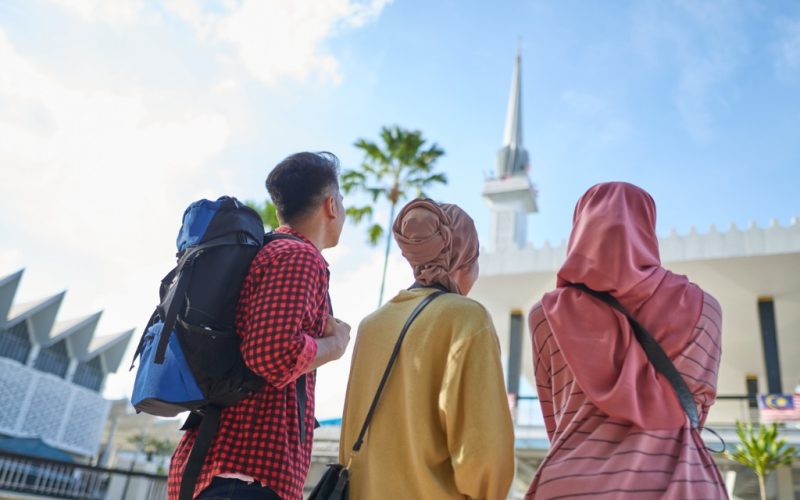Introduction
Explore, experience, and elevate your journey with purpose. The world is vast, diverse, and full of wonders waiting to be discovered — majestic landscapes, vibrant cultures, historic cities, and mouthwatering cuisines. But for Muslims seeking to travel with intention, there’s more to a journey than just ticking destinations off a list.
To “travel halal” is to journey in a way that aligns with Islamic principles — from the food you eat and the places you stay, to the way you interact with others and represent your faith. It’s about seeing the world right — not just through a tourist’s eyes, but through the lens of faith, ethics, and purpose.
What Does It Mean to “Travel Halal”?
Halal travel is more than just avoiding pork or alcohol. It’s a lifestyle approach to travel rooted in the values of Islam. When you travel halal, you’re mindful of:
- Food: Choosing halal or permissible meals, avoiding alcohol, and ensuring food is prepared according to Islamic dietary laws.
- Modesty: Dressing appropriately, observing gender boundaries, and choosing modest activities and accommodation.
- Prayer: Planning for daily salah, finding clean spaces to pray, and staying spiritually connected even on the move.
- Intentions & Ethics: Traveling with a purpose, avoiding harm, respecting cultures, and behaving with Islamic manners (akhlaq).
In essence, it’s about being a responsible, respectful, and reflective traveler — a guest in the world, not just a consumer of it.
Why Halal Travel Is Growing
With over 1.9 billion Muslims worldwide, the demand for Muslim-friendly travel options is on the rise.
What’s driving this trend?
- Increased Awareness: Muslim travelers are more conscious of their lifestyle and want to maintain it while traveling.
- Improved Infrastructure: More destinations offer halal food, prayer rooms, and modest accommodations.
- Representation: Muslim travel bloggers, influencers, and content creators are sharing their experiences, making halal travel more visible and accessible.
How to Travel Halal: A Quick Guide
If you’re new to halal travel or planning your next trip with faith in mind, here’s a guide to help you see the world right:
1. Start with the Right Intention
Every journey begins with a purpose. Whether you’re traveling for rest, learning, or adventure, make niyyah (intention) to honor your faith through your experiences. This transforms your journey into an act of worship.
“Actions are judged by intentions.” – Prophet Muhammad ﷺ (Bukhari & Muslim)
2. Plan for Halal Food
Research halal restaurants or vegetarian options in advance. Apps like Zabihah and Halal Navi are great for this. You can also:
- Book accommodations with halal-certified kitchens
- Look for Middle Eastern, Turkish, or Indian eateries (they often serve halal)
- Pack snacks or instant halal meals for remote areas or layovers
3. Prioritize Prayer
Missing salah while traveling can be easy if you’re not intentional. Tips:
- Download prayer time apps with Qibla direction
- Carry a portable prayer mat and wudu-friendly wipes
- Use travel concessions (like combining Dhuhr and Asr) when needed
- Find mosques in advance, especially for Jumu’ah
4. Dress Modestly and Comfortably
Choose clothing that’s modest but suitable for the weather and culture of the place you’re visiting. Lightweight, loose-fitting clothes work well in warm climates. For women, scarves can double as travel wraps or sun protection.
You’re not just a traveler — you’re a representative of Islam. How you dress speaks before you do.
5. Book Muslim-Friendly Stays
Platforms like HalalBooking and Muslim-friendly hotels offer options like:
- Halal food on-site
- Alcohol-free rooms
- Separate pool/spa times for men and women
- Prayer spaces
Airbnb is also a great option for private family stays or villa-style travel.
6. Be Respectful of Local Culture
Just as you expect others to respect your faith, return the favor. Learn basic phrases, follow local customs, and avoid being judgmental. Islam encourages kindness, patience, and adaptability.
Top Halal-Friendly Destinations
Here are some travel spots known for welcoming halal-conscious travelers:
1. Malaysia
- A leader in halal tourism with plenty of certified food and services.
- Great mix of city life, beaches, and culture.
2. Turkey
- A cultural melting pot with stunning mosques, halal food, and rich Islamic history.
3. Morocco
- Beautiful architecture, natural beauty, and deeply rooted Islamic traditions.
4. UAE (Dubai, Abu Dhabi)
- Modern luxury meets Muslim-friendly infrastructure.
5. Indonesia
- Home to the world’s largest Muslim population — warm, welcoming, and full of halal options.
Traveling Halal in Non-Muslim Countries
Yes, it’s possible and deeply rewarding. Traveling in countries where Muslims are a minority often provides:
- Stronger sense of identity
- Opportunities for dawah through good character
- Moments of spiritual growth in solitude
Examples of Muslim-friendly cities in non-Muslim countries:
- London: halal restaurants, prayer rooms in malls/airports, diverse Muslim communities.
- Cape Town: strong Muslim culture and heritage.
- Tokyo: increasing awareness and halal food availability.
- Sarajevo (Bosnia): a hidden gem with Islamic history and natural beauty.
Travel as Worship
The Qur’an reminds us: “Say, [O Muhammad], ‘Travel through the land and observe how He began creation.’” – (Qur’an 29:20)
Travel, when done with awareness and gratitude, becomes a means of reflection — a form of worship. Witnessing the beauty of Allah’s creation, engaging with His diverse creation, and remembering Him throughout the journey — this is how you travel halal and travel right.
Final Thoughts: The Halal Traveler’s Impact
The way we travel matters. When you travel halal, you carry your faith with you — not just on your plate, but in your behavior, choices, and interactions. Your presence can break stereotypes, build bridges, and represent Islam in a beautiful, dignified way.












